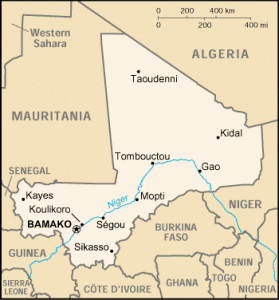May, June and July have been very busy months for me (hence the lack of daily updates).
 In May, I attended and presented at the North American Shortwave Broadcasters annual meeting in Washington DC, then spent nearly a week in Ohio at the Dayton Hamvention–June and July have been filled with sporadic travel.
In May, I attended and presented at the North American Shortwave Broadcasters annual meeting in Washington DC, then spent nearly a week in Ohio at the Dayton Hamvention–June and July have been filled with sporadic travel.
During my travels in May, controversy swirled around the Smith-Mundt Modernization Act and its impact upon radio broadcasting since it passed mark-up as an amendment to the House version of the National Defense Authorization Act on May 18. The bill is now before the US Senate.
What is the Smith-Mundt act? Per Wikipedia:
The US Information and Educational Exchange Act of 1948 (Public Law 80-402), popularly referred to as the Smith–Mundt Act, specifies the terms in which the United States government can engage global audiences, also known as public diplomacy.
The act was first introduced as the Bloom Bill in December 1945 in the 79th Congress and subsequently passed by the 80th Congress and signed into law by President Harry S. Truman on January 27, 1948.[…]
There are three key restrictions on the U.S. State Department in the Smith–Mundt Act.
The first and most well-known restriction was originally a prohibition on domestic dissemination of materials intended for foreign audiences by the State Department. The original intent was the Congress, the media and academia would be the filter to bring inside what the State Department said overseas […]
The second and third provisions were of greater interest to the Congress as they answered critical concerns about a deep-pocket government engaging domestic audiences. Added to the Bloom Bill, the predecessor to the Smith-Mundt Bill in June 1946 by Representative John M. Vorys (R-OH) “to remove the stigma of propaganda” and address the principle objections to the information activities the Congress intended to authorize.
 The Smith-Mundt Act is the very reason why so few US Citizens have ever heard of the international radio broadcaster Voice of America (VOA): the law forbids them from “targeting” an American audience. In their current state, the VOA and many other BBG international broadcasting entities are not likely to be a source of the type of propaganda many fear could be unleashed with the lifting of the Smith-Mundt Act. Speaking as one familiar with the VOA’s broadcasts–I know many who work at the VOA, I’ve listened to their broadcasts for decades and I actively read their online content–I can comfortably state that VOA produces quality journalism and certainly provides another credible voice in the cloud of international broadcasters on the air or online. Their journalists have a mandate to report the truth, even when they find it necessary to be critical of the US government.
The Smith-Mundt Act is the very reason why so few US Citizens have ever heard of the international radio broadcaster Voice of America (VOA): the law forbids them from “targeting” an American audience. In their current state, the VOA and many other BBG international broadcasting entities are not likely to be a source of the type of propaganda many fear could be unleashed with the lifting of the Smith-Mundt Act. Speaking as one familiar with the VOA’s broadcasts–I know many who work at the VOA, I’ve listened to their broadcasts for decades and I actively read their online content–I can comfortably state that VOA produces quality journalism and certainly provides another credible voice in the cloud of international broadcasters on the air or online. Their journalists have a mandate to report the truth, even when they find it necessary to be critical of the US government.
Don’t be mislead, however; VOA is a diplomatic arm of the United States, and as such would fit the broadest definition of what might be considered propaganda. In other words, VOA represents an American viewpoint on the news. Indeed, I consider (and it’s only fair to acknowledge) that every radio or television broadcaster’s voice exhibits some bias, even if the broadcaster makes claims of “fair and balanced reporting” or says they are “reporting the truth.” There is always a leaning, however modest. Even at the tender age of eight, listening to my Zenith Transoceanic in my bedroom, I recognized this.
So why all of the fuss about the Smith-Mundt Act? Even as a child, I remember finding it quite easy to tune in the Voice of America. The magic of shortwave radio almost by default means that there are no borders that can control how shortwave distributes content. It’s even more absurd to think of enforcing these restrictions now in the internet age–indeed, by clicking this link, you can freely go to the VOA website to read, watch or listen to thousands upon thousands of hours of content.
So, in reality, VOA has never been prevented from delivering its content to the US. It’s just not well-known in our country.
But this is the state of things today: If the Smith-Mundt Act were lifted, the US State Department could, if they choose, funnel resources into effectively targeting US audiences. In the US, you could see VOA ads on Facebook, hear ads on the radio, a VOA TV channel could be launched–FM relay stations could be established in, say, Nebraska.
Does that sound strange? Keep in mind that in the UK (and in many other countries) there has never been this division between government-funded international and domestic broadcasting. The BBC broadcasts to both a domestic audience and an international audience via the BBC World Service. They routinely recycle content between the two.
The Smith-Mundt Act has both critics and supporters on both the left and right of the aisle. The think tank, The Heritage Foundation, recently held a panel discussion with a slant towards lifting the Smith-Mundt Act. They stated:
Critics […] have charged that modernizing the Smith-Mundt Act will lift the floodgates for U.S. government propaganda aimed at U.S. citizens. Not so. Rather, the amended act will force greater government transparency and accountability and it will allow Americans insights into what Washington is communicating to audiences around the world.
Yet, many of my friends who work within the VOA see the lifting of Smith-Mundt as a means to target various diasporas within the US. Perhaps, for example, via local FM relay, VOA could broadcast in Swahili to communities the US with large populations of recent immigrants who could benefit from this news source.
The watchdog organization BBG Watch, on the other hand, describes their concerns about lifting Smith-Mundt:
While BBG Watch supports placing all Broadcasting Board of Governors (BBG) international broadcasts and other programs in the public domain for anyone to use free of charge, some of us are concerned that the proposed Smith-Mundt Modernization Act of 2012 is so broadly written that it gives BBG and other US government officials unrestricted power to target American citizens with government information marketing. We would support the modification of the Smith-Mundt Act if it included clear and strict rules and a prohibition on active direct marketing of BBG programs to US citizens and US broadcasters. There is a real fear that BBG officials would take advantage of the new law, if it passes, to move resources from international to domestic information activities.
Herein lies my fear regarding this restructuring–that the State Department could tap into the already limited resources allotted for international broadcasting via shortwave radio, in order to shift attention to a domestic audience (who already, in truth, has full access to all of the US international broadcasting entities via the world wide web). Yet the international broadcasting need is much greater than our own–many who receive these broadcasts–in rural Africa, for example–have little else to rely upon for their understanding of the United States and their perspective on the world. It could harm starve the United States’ relationship with people in these regions, in essence lopping off one of our valuable diplomatic arms.
A balanced approach
The best way to be informed about the progress of the act is to follow Kim Andrew Elliott’s blog on international broadcasting and diplomacy. He does an amazing job of picking out news items relevant to the act and posting them along with his comments. Indeed, when I last asked him about the Smith-Mundt act several weeks ago, he suggested checking out this post: http://kimelli.nfshost.com/index.php?id=13356
Within that post, there is a link to a previous post, in which he state why the domestic dissemination ban is now enforceable rather than outmoded by the internet. Dr. Elliott also commented:
Sen. Gillibrand removed the Thornberry-Smith language from the Senate version of the DAA. Thornberry-Smith could possible return in the conference process, or perhaps even from the floor, but I wouldn’t bet on it.
In future attempts to relax the domestic dissemination ban, the BBG should not be involved. It should remain neutral. The stakeholders in the US should initiate any such legislation. Such stakeholders would include….
1) US ethnic media, who could use news about the countries of interest, in the languages of their audiences. At no extra cost to the taxpayers, USIB could provide a valuable public service.
2) Americans who are interested in what in contained in US international broadcasting and public diplomacy
3) US domestic media who could barter their content on US domestic affairs for USIB content on world affairs. This win-win would bring USIB content to US audiences, hence a need to relax the ban.
Note that the UK never had any qualms about domestic distribution of BBCWS. It was available only in the overnight hours, on BBC R4, because it was assumed the content was not of sufficient interest to sustain a domestic service. Now it’s available 24/7 via digital BBC radio bouquets in the UK and, of course, via internet. BBC even proudly proclaims the domestic RAJAR ratings for BBCWS.
A tough act to follow…
So, is lifting or modifying the Smith-Mundt Act wise? Only time can tell. One thing is certain: careful consideration of all eventualities must be taken into account before action is taken, and envisioning all potential outcomes could truly prove tough.
For more on the Smith-Mundt act and hundreds of other news items that have an impact on international broadcasting and diplomacy, subscribe to Kim Andrew Elliott’s news feed.





 In May, I attended and presented at the
In May, I attended and presented at the 